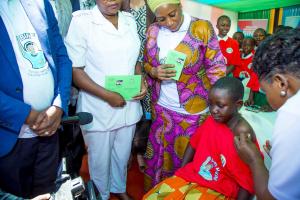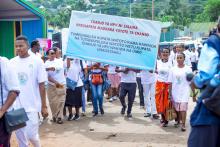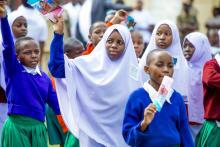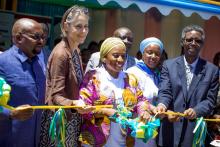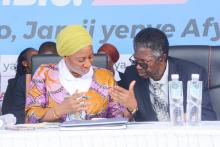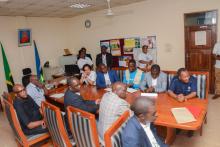Over 5 million girls in Tanzania to receive HPV vaccine to combat cervical cancer
Mwanza/Geneva, – The Ministry of Health of the United Republic of Tanzania, in partnership with Gavi, the Vaccine Alliance (Gavi), UNICEF and the World Health Organization (WHO), today launched the national multi-age cohort (MAC) vaccination campaign against the human papillomavirus (HPV) – the leading cause of cervical cancer. The campaign, which is targeting over 5 million girls aged 9–14 years, will run from Monday, 22 April, to Friday, 26 April 2024.
While cervical cancer remains a significant cause of death among women in Tanzania, with more than 10,800 cases and 6,800 deaths in 2022 alone, it is vaccine preventable. The HPV vaccine is safe and highly effective in preventing infections. During the campaign, eligible girls will have the opportunity to receive a single dose of the HPV vaccine at no cost.
Efforts to increase access to the HPV vaccine across Tanzania have made substantial progress. In 2018, the two-dose vaccine was integrated into the national routine immunization programme for 14-year-old girls, demonstrating the government's commitment to safeguarding the health and well-being of future generations.
To date, coverage of the first dose of the HPV vaccine has reached 79%, and the second dose is at 60%. Combined efforts are needed to ensure every girl in Tanzania receives crucial protection against this deadly yet preventable disease. Following the MAC campaign, the vaccine will continue to be provided routinely as a single dose to nine-year-old girls. It will go a long way towards increasing girls’ protection.
Tanzania’s progress in administering the HPV vaccine is a critical part of a broader global initiative supported by the Vaccine Alliance, which has committed additional funding and resources towards reaching 86 million girls worldwide with the HPV vaccine by 2025.
The campaign will leverage African Vaccination Week, synchronized with World Immunization Week (24 to 30 April), during which routine childhood vaccinations along with health education will be provided for girls in schools, health facilities and community centres countrywide.
Throughout this week, the Ministry of Health, Gavi, UNICEF and WHO are urging communities to encourage girls to get vaccinated against cervical cancer and to aim for a future where no girl is burdened by this disease.
Notes to editors
Multi-age cohort campaigns are implemented alongside a routine immunization introduction, to maximize impact by reaching eligible girls outside of the targeted age for HP vaccination through the yearly routine immunization system (age 14 years in the United Republic of Tanzania).
Resources:
- Everything you need to know about the HPV vaccine – from Gavi’s VaccinesWork platform
- WHO Cervical cancer Fact sheet
About Gavi, the Vaccine Alliance
Gavi, the Vaccine Alliance is a public-private partnership that helps vaccinate more than half the world’s children against some of the world’s deadliest diseases. The Vaccine Alliance brings together developing country and donor governments, the World Health Organization, UNICEF, the World Bank, the vaccine industry, technical agencies, civil society, the Bill & Melinda Gates Foundation and other private sector partners. View the full list of donor governments and other leading organisations that fund Gavi’s work here.
Since its inception in 2000, Gavi has helped to immunise a whole generation – over 1 billion children – and prevented more than 17.3 million future deaths, helping to halve child mortality in 78 lower-income countries. Gavi also plays a key role in improving global health security by supporting health systems as well as funding global stockpiles for Ebola, cholera, meningococcal and yellow fever vaccines. After two decades of progress, Gavi is now focused on protecting the next generation, above all the zero-dose children who have not received even a single vaccine shot. The Vaccine Alliance employs innovative finance and the latest technology – from drones to biometrics – to save lives, prevent outbreaks before they can spread and help countries on the road to self-sufficiency. Learn more at www.gavi.org and connect with us on Facebook and Twitter.
About UNICEF
UNICEF promotes the rights and wellbeing of every child in everything we do. Together with our partners, we work in 190 countries and territories to translate that commitment into practical action, focusing special effort on reaching the most vulnerable and excluded children, to the benefit of all children, everywhere.
For more information about UNICEF and its work, visit: www.unicef.org
Follow UNICEF on Twitter, Facebook, and YouTube: @UNICEFTanzania, and on Instagram: @uniceftz
About WHO
The World Health Organization (WHO) is a specialized agency of the United Nations responsible for international public health. Together with Government of Countries, we coordinate the world’s response to health emergencies, promote well-being, prevent disease and expand access to health care. By connecting nations, people and partners to scientific evidence they can rely on, we strive to give everyone an equal chance at a safe and healthy life.
Dedicated to the well-being of all people and guided by science, the World Health Organization in Tanzania leads and champions the country’s efforts to give everyone, everywhere an equal chance to live a healthy life. Learn more at https://www.afro.who.int/countries/united-republic-tanzania and connect with us on Facebook and Twitter.




